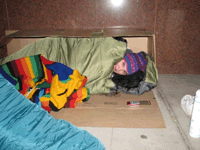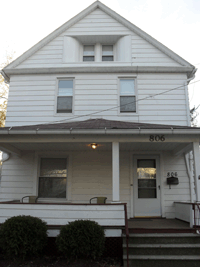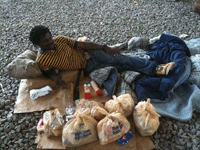A young man living in a tent, in the freezing cold, wore a University of Akron sweatshirt. He hoped to become a student, but that dream died due to unfortunate circumstances.
Many homeless adults once dreamt of making something of themselves…all they needed was a chance, an opportunity to become great.
We are all given one life to live, but what if that life gets a bad start, with seemingly no opportunity to succeed?
In the city of Akron, the Horizon House program is here to grant individuals opportunities they never had, allowing them to dream again. They are a two-year transitional program for young adults, ages 18-22.
“As a community we sometimes lose some very smart, bright, capable men and women to circumstance, and that’s what we’re trying to change,” Joseph Scalise, Housing Coordinator at the Ohio Multi-County Development Corporation, said.

Making a Way
The reasons youth become homeless vary.
Often they have just aged out of Children’s Services Board (CSB) and have nowhere to go, or they are runaways due to conflicts at home.
“What happens to most of these young people is they end up as methadone clients of ours 10 years down the line. So we asked ourselves, ‘What can we do to interact with this population?’” Scalise said.
At least 6 months sobriety is required to be eligible for the program.
“There are a lot of young people that don’t have substance abuse issues, that are just homeless, and those are the ones that we’re trying to recruit for success,” he continued, “We’re trying to attack homelessness as the issue.”

Working Together
There are currently three homes in Akron, with a fourth coming this January.
“They are very modest homes, but we’re doing some really special things in them,” Scalise said.
As a non-profit affiliated with the Community Health Center, they are able to offer more to the homeless than they could on their own. This includes counseling, mental health evaluation, and a family practice doctor.
“It’s been tremendously successful for us,” Scalise said.
Creating a Plan
As a part of the program, residents create their own life-management plan.
“We ask them to take an honest assessment of where they are now and what their goals are for two years from now,” Scalise said.
With the help of a case manager they lay down each and every step needed to move forward.
“This is all about teaching them how to fish - not giving them fish to eat,” Scalise said, “A little bit of knowledge goes a long way.”
The program encourages residents to be proactive.
“They need to make forward momentum on their life maintenance plan in order to stay in the house. If that means going to school, then they need to be in school. If its working, they need to work 20 hours a week,” he continued, “It’s definitely effort driven.”

The Need is Great
Over 300 young people, ages 18-22, go homeless in Summit County each year
(www.commhealthcenter.org).
For the past three years, Scalise has participated in the Point in Time Count with the Continuum of Care (CoC). The CoC goes out one night in January every year to count the homeless in Summit County.
“The people you find don’t always fit the stereotypical homeless person,” Scalise shared.
He’s found many homeless downtown, living in tent cities.
“They do such a good job of cloaking themselves down there that you wouldn’t even recognize there are people there in a lot of areas,” he continued.
Many homeless choose not to stay at a shelter within walking distance because of its rules. This shelter encourages residents to actively find employment and take free classes at their career center.
“Most of the guys won’t go to the Haven of Rest,” he said, “Even though they’re homeless, they don’t want to be around a bunch of ‘old homeless guys’. They think ‘I’m not that guy. I’m still young. I’m cool.’” Scalise explained.

Wanted
Last year, a social action group from St. Mary’s Perish of Hudson, “Just Faith”, took a tour of the Horizon homes. They are now training to become mentors.
“The idea is that a lot of these young folks feel they’ve been alone for so long. I want them to know there is a community out there that cares about them and people that want to get involved with them,” Scalise said.
Many of the youth are “closed-off” when they first arrive.
“Naturally, they’ve internalized everything for most of their lives. There’s been a lot of pain so they’ve built walls,” Scalise explained.
As they grow through the program, many begin to open up and blossom into the unique individual that they are.
“When you get a chance to watch somebody come from a position of no self-esteem and a lot of self-doubt, to a position where they feel good about themselves and realize ‘Hey I do have something to offer and am important in this world’ then that’s all we’re trying to do. Trying to move people to self-sufficiency,” Scalise said.
But they cannot do it alone.
“I think there’s definitely a bridge that needs to be supplied by the community and that’s all we’re trying to do here,” he continued.
If you are interested in helping this non-profit they welcome mentors, financial donations, furniture donations, cleaning supplies and other household items. Also, donating your clothing to the Salvation Army and Goodwill is helpful for their shopping trips
For more information on the Horizon House program please visit www.commhealthcenter.org.
To read Part Two of the story click the link.
If you have any story ideas, questions, or comments you can contact me at Katie@akroneur.com.